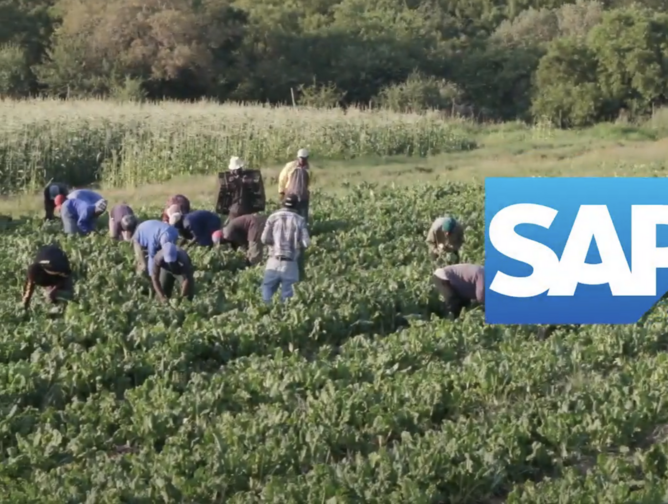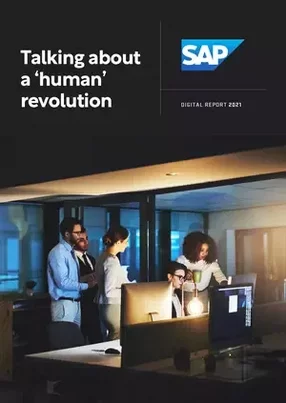With organisations across the world being held more accountable for the labour practices and environmental consequences of the goods and services they procure both by customers and governments, a key question businesses should ask is how ethical is your supply chain, says Tom Janoshalmi.
“I’m a passionate believer of how every supply chain needs to be designed to be resilient and to be transparently sustainable,” says Janoshalmi. He feels that in today’s world, there is a “clear need to have a consolidated, single view of who organisations serve, their business partners, whether that’s customers and suppliers.”
SAP is a German multinational software corporation based in Walldorf, Baden-Württemberg. It develops enterprise software to manage business operations and customer relations. As Senior Vice President in Customer Success Janoshalmi’s role is to look after the next generation cloud delivery programme for a wide range of clients.
“What makes me proud is the impact that we can have both on our customer's businesses, but also on people's lives,” he says.
“It’s really fascinating to see that transactions that are processed through SAP systems and technology can impact so many lives whether it’s a pharmaceutical company that produces vaccinations and that’s how we will save lives, or whether it’s an airplane manufacturer which makes sure that flying becomes safer because we process data in a very different way, or whether it’s an energy and natural resource company which is shifting completely towards future energies or a carbon neutral footprint.”
Now, management teams are not just looking into how the current global crisis is impacting their company, but that their business processes are future proof. This has to take into account the new business environment. With more people working and buying remotely, the Covid pandemic has accelerated technology shifts with most transactions now taking place online.
“Even customers who previously didn’t have an e-commerce focus are now pivoting business models and business processes towards these online transactions,” he says.
Janoshalmi believes that this digital transformation lends itself to a new data strategy that can remodel business processes to establish “responsible supply chain practises and processes that will ultimately make the organisation more competitive.”
Bluntly put, this requires a business to know precisely what is going on not just within its HQ, but throughout its supply chain.
“For a supply chain to be environmentally responsible and ethical the company needs to have full control of the end to end processes and not just on paper, but within a system to make sure that the process is compliant with these requirements,” he says.
That is where SAP can help. “We help them realise that goal,” he says.
SAP works with thousands of organisations in both the public and private sectors. In recent years with greater consumer awareness and governmental regulation, the ethical supply chain has become a greater priority for businesses, together with compliance goals and sustainability benchmarks. For instance, Janoshalmi states that the UN has 10 criteria with which to measure supply chain sustainability, ranging from environmental responsibility to labour practises, human rights and corruption. SAP works to ensure that not only are its clients compliant to current regulations, but to future proof them from inevitable changes both within the regulatory sphere and consumer’s ethical demands.
“Most recently we have been looking at the next generation cloud delivery that would make our customers, platform and infrastructure totally future-proof,” he says. “Cloud is the pivot making sure that there is resilience in the supply chain.”
Janoshalmi confesses to always being fascinated with supply chain challenges. His academic background is about technology and innovation.
The key to achieving supply chain stability is to ramp up the speed and resilience of the infrastructure, while increasing the usability of the application, thus creating inherent intelligence to allow clients to solve complex problems.
“When you combine the agility and the speed that your infrastructure can provide with the intelligence of the application, then these processes can be redesigned so that they are truly future-proof or resilient,” he says. “At the same time they can provide the right answers to ethical challenges.”
Recently, SAP conducted an Agile Procurement Insights Research together with Oxford Economics. They discovered that roughly half of the executives interviewed said they do not regularly refresh their risk mitigation plans to address potential disruptions. Such outmoded plans do not reflect current business reality. “We’re seeing the implications of it now with the global crisis,” he says.
For Janoshalmi what was even more interesting was that only a third of those interviewed felt that either their procurement or supplier risk management capability was highly effective.
To achieve an efficient supply chain you need to keep a good inventory. In the research mentioned above, only half of the executives had real-time or near real-time visibility to their inventory levels. This affects management’s ability to pre-empt and respond to any issues.
“The impact on inventory levels is also not monitored real time,” he adds. “Therefore their ability to respond is negatively influenced or impacted by these missing capabilities.”
Instead of relying on the past, companies need to have supply chain architecture that is future-proofed to the new business reality. Janoshalmi believes that this will be increasingly automated.
“Automation will redefine supply chain architectures,” he says. “By 2025, which is not that far away, 60% of human tasks will be automated.” In addition roughly 90% of large enterprises will generate revenue from data as a service.
Janoshalmi believes that the near future will see innovative partnerships to create more efficient ways of managing order fulfilment. This will focus very much on the individual customer or consumer, capturing what they value and expect.
“This shift is directly impacting supply chain social responsibility and ethical value chains,” he says, with the most successful companies understanding and delivering upon customer expectations. This will make businesses both more efficient and competitive.
He sees AI as playing an important and positive role in driving this process forwards, allowing humans to focus more on the higher value added cognitive activities.
“60% of the tasks might be fully automated in the near future, but human beings will still be in charge of designing the sustainable supply chains,” he says. “Technology clearly needs to be an enabler to this change, not an impediment. Human beings can spend more time thinking.”
It is this which Janoshalmi describes as the Fifth Industrial Revolution, placing the human being at the ethical heart of business.
“There’s no stopping the Fifth Industrial Revolution,” he says. “Technology driven, new efficiencies and new capabilities described the Fourth Industrial Revolution. And now we are looking at the Fifth, which is how we humanise all of this change. A really significant part of this human centric, industrial revolution is making sure that processes are ethical.”
SAP works with partners to make supply chains more ethical and more transparent. One cooperation is with FRDM, a provider of supply chain mapping technology for companies and governments, established by Janoshalmi’s close business friend Justin Dillon.
Through its mapping FRDM provides companies with supply chain transparency to mitigate risks, such as human trafficking, forced labour and environmental concerns. Dillon created FRDM to address the issue of forced and child labour within the supply chain, an issue upon which he feels most strongly. Like his friend, he is driven by a strong sense of a moral purpose, believing that we can drive change more through influencing what people buy more than through charitable activities.
“We believe that we can change the world through the power of our purchases far more than the power of our donations,” says Dillon. “We just need technology to help us align our values with the things that we buy.”
Dillon believes that a key part of managing risk is to ensure that the values of your suppliers more closely align with your own.
“Your supply chain is a business risk. It’s an operational risk, but it’s also a reputational risk. So part of our job is to help uncover and connect all those dots,” he says.
He believes that by meeting these risks head on, and by focusing on the positives within an organisation you can become stronger.
“A lot of my work is to help organisations think differently around what types of problems they’re taking on. Look at the talent, the backstory, the origin story of why you’re here as an organisation. What kinds of problems can you address in the world?” he says. “By doing so, it makes you stronger. It makes you more talented, and makes the world a better place.”
Janoshalmi is currently seeking more technology or services partners, like FRDM, to help make supply chains more ethical.
“We need to work with our customers and our future customers, [to persuade them] that they need to invest in building transparent and resilient supply chains,” he says.
Janoshalmi realises that there are major challenges ahead if his dream of a more ethical supply chain is to be realised, but he also believes that there is both an opportunity and obligation to make this happen. Governments and international organisations, such as the UN, have regulatory control mechanisms already in place, including the public disclosure of the reduction of slavery in supply chains. But ultimately the message for both organisations and consumers is really simple.
“What is coming next is really to buy better,” he says. “If I had to use just two words, then it’s really to buy better."



